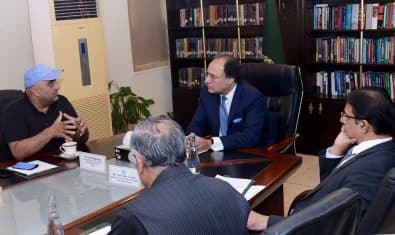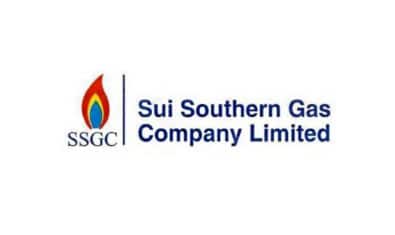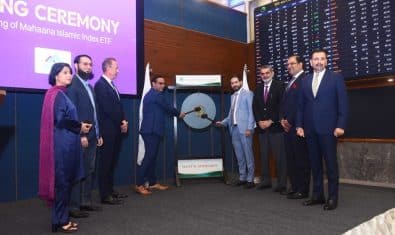The calendar year 2015 proved to be a tough one for the government as well as for telecom sector with respect to legislation, revenues, taxation and investment. With ample amount of regulatory measures, telecom industry struggled throughout the year yet showed resilience and better than expected results.
Below is a recap of major events from 2015:
Biometric Verification System (BVS)
The government framed National Action Plan (NAP) to deal with terrorism and extremism. Re-verification of SIMs through BVS was made an integral part of the plan to curb identity theft and to make sure that no unregistered or unknown SIM was being used in the country for criminal as well as for civil activities.
With this, operators were tasked to verify each and every SIM in the country through biometric verification system. This SIMs verification through BVS was largest exercise of such kind in the world.
Telecom companies were given 90 days to verify their customers through BVS, as a result total number of active SIMs dropped down from 139 million to 111.5 million.
The telecom industry deployed 80,000 biometric machines for the SIM re-verification drive while spent about $60 million in total on the entire exercise of re-verification of SIMs.
The move slashed revenue of Cellular Mobile Operators (CMOs) by 20 percent and also hit the prospects of existing as well as unsold 3G/4G spectrum pretty hard.
Since the biometric verification of SIMs, the number for active SIMs has climbed again to to 124.4 according to data till the end of November 2015.
Cyber Crime Bill
The Ministry of Information Technology framed Electronic Crimes Bill for controlling cyber terrorism/ crimes and termed it a vital step towards protecting national integrity and security against any possible hacking, data intrusion or illegal access to sensitive government affairs. Bill also aimed at ensuring public safety against cyber crimes such as data and identity theft and other related issues they face while on Internet.
The proposed Bill has been presented before the National Assembly, after which it would be sent to the Senate of Pakistan for the final approval.
However before reaching this stage, the Bill faced extreme criticism from opposition political parties and civil societies. According to them, the proposed Bill contains clauses intending to control or suppress different forms of political dissent in social media, which could affect civil liberty directly or indirectly.
Under the proposed law, sweeping powers would be given to agencies which could prosecute children merely on accusations and may be very dangerous in future, they added.
PPP MNA Shazia Marri raised concerns over some clauses of the proposed law and announced that Pakistan peoples Party (PPP) would strongly resist any such law against the human rights in the Parliament.
Taxation
Pakistan ranks 4th among the most heavily taxed telecom industries in the world. Taxes on telecom industry account for over 30% of the total cost of mobile ownership. All the four provinces imposed 19 percent sales tax/withholding tax from July 1, 2015 on mobile/internet users. Later Punjab province withdrew the tax while Sindh government reduced it from 19 percent to 18 percent while other two provinces still collect it at 19.5%.
Currently 18.5% FED on telecom customers, 14% advance tax on consumption of telecom services, 16% FED on banking services is being collected. Import duties on mobile phones also doubled during the year.
Customs duties on network equipment were increased from 5% to 15-20%. Exemption of imported equipment from sales tax was also removed. Resultantly, the increase in custom duty has affected the telecom industry negatively in term of slow investment.
The government gave a marginal rebate in shape of abolishing Rs 250 per activation tax on issuance of new SIM during the first phase of the re-verification drive. The government partially agreed with a proposal of telecom industry and decided that NADRA would charge only Rs 10/- (instead of Rs 23/-) for verification purposes for the period of re-verification.
Grey Trafficking
PTA claimed significant decline in grey trafficking, besides reduction in voice call rates for overseas Pakistanis, after the withdrawal of International Clearing House (ICH) policy.
The government on February 27 withdrew ICH policy and brought the Access Promotion Contribution (APC) to Universal Service Fund (USF) to zero, which helped in eliminating grey trafficking after voice call rate were reduced from Rs 8.8 per minute to a minimum rupee one only for overseas Pakistanis.
According to the government international incoming traffic grew to 1.6 billion minutes per month, up from mere 370 million minutes per month during ICH.
Despite all this, grey trafficking is still there and is allegedly used for financing terrorism. Government is still taking measures to completely eliminate the grey traffic to avoid any illegal usage of telephony services.
Telecom Policy
As a landmark progress for the future growth and development of ICT and particularly Telecommunications Sector of Pakistan, the Economic Coordination Committee approved the Telecommunications Policy 2015.
The vision articulated in the policy is availability of universal, affordable and quality telecommunication services provided through open, competitive and well managed markets which can be used by people to the benefit of the economy and society.
The policy has included various new elements like competition framework, spectrum strategy, spectrum sharing, satellite communication, Over the Top services, convergence etc., which were not present in earlier policies.
It is expected that competition framework will make telecom market more efficient in terms of quality of service and choice of services available to the consumers.
Major new element of the new policy relates to provision of a wholesome treatment for frequency spectrum management in the country. The provisions like spectrum strategy, refarming, market mechanisms for more efficient use of spectrum coupled with provisions on infrastructure sharing will facilitate governing this scarce resource in a more efficient and market oriented manner which will ultimately benefit the users and spur further investments in the country.
Satellite communications and provision of bandwidth and retail broadband and telecoms through this medium have for the first time been addressed to structure and further grow the segment. Proper business flow under set parameters will provide more clarity to satellite telecoms based businesses while ensuring appropriate compliance.
3G/4G Auction
After its failure to auction the remaining 3G/4G spectrum and generate non-tax revenue of Rs 56 billion in the 2014-15, the government upward revised the revenue target to Rs 65 billion for 2015-16.
PTA, for the purpose, hired Interconnect Communications, a U.K based consultancy firm to assess market demand for the auction of remaining 3G and 4G licenses. However, chances for any further auction of 3G/4G spectrum look bleak.
Forensic Audit
The Federal Board of Revenue (FBR) decided to conduct forensic audit of the cellular companies to scrutinize tax collection and financial statements submitted by them.
According to PTA annual cellular mobile revenue during 2013-14 was Rs 322.7 billion which is 70 percent of the total telecom revenues (Rs 465.5 billion).
FBR, PTA and cellular operators are likely to formulate a way of forensic audit during coming months.
Youtube
Despite the recommendations of Senate Standing Committee on Information Technology and Telecommunication, ban on YouTube remained in place.
Revenue/investment
Telecom contribution to the national exchequer, revenues and investment registered significant decline during 2014-15 as compared to the preceding year.
PTA states that telecom contribution to exchequer declined from Rs 243.3 billion in 2013-14 to Rs 126.3 billion in 2014-15.
Telecom revenues declined from Rs 463.97 billion in 2013-14 to Rs 449.49 billion in 2014-15. The data further shows that telecom investment in the country declined from $1.8 billion in 2013-14 to $852 million during 2014-15.
Mobilink/Warid Merger
At the end of 2015, Mobilink and Warid declared to merge their operations in Pakistan. As a result, after necessary approvals a merged company with more than 45 million customers will emerge.
Subscribers
The number of active SIMs reached to 124.24 million at the end of November 2015, while total number of broadband subscribers reached 24.8 million at the end of Nov 2015.
Number of 3G/4G users grew to 21 million till the Nov 2015.



























There was a merger as well.